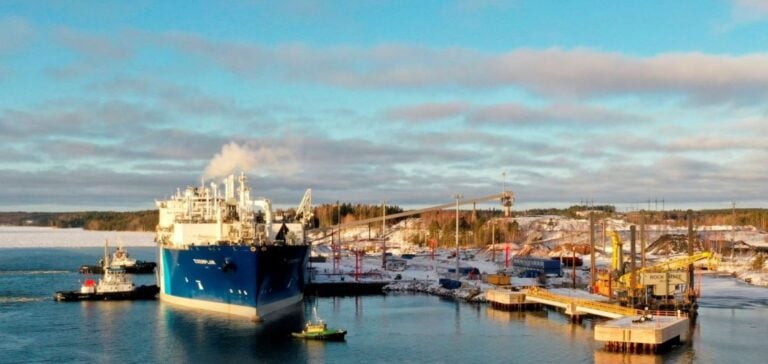Gasgrid Finland announces that 11 of the 22 slots available at the Inkoo floating LNG terminal for the year 2025 have already been reserved.
This reservation process, finalized in August 2024, reflects sustained demand in a context of diversification of supply sources in Northern Europe.
Unallocated capacity will be offered on the spot market, enabling buyers to adapt to market fluctuations and consumption needs.
The provision of slots based on vessel capacity and gas demand illustrates the flexibility of the Inkoo terminal to respond to market developments.
The allocation process, scheduled to be completed by the end of November 2024, relies on close coordination with the terminal’s customers to optimize infrastructure use throughout the year.
Impact of Balticconnector and diversification of supplies
Increased interest in LNG in Finland follows the temporary interruption of the Balticconnector pipeline in October 2023, impacting flows between Finland and Estonia.
Although the pipeline has been operational again since April 2024, the country is stepping up its LNG imports to offset the uncertainties of pipeline supply and ensure the continuity of its energy system.
In 2024, Finnish LNG imports reach 1.22 million tonnes, approaching the total volume of 2023.
Imports come mainly from Norway and the USA, with 660,000 and 340,000 tonnes respectively.
This diversification of supply, combined with the strategic use of the Inkoo terminal, aims to reduce Finland’s dependence on traditional imports and strengthen its resilience to gas market disruptions.
Price trends and opportunities for buyers
LNG prices in Northern Europe are rising, partly due to supply concerns and extended maintenance periods in Norway.
At the end of August 2024, Platts estimates the spot price for LNG delivered in North-Western Europe at $12.583/MMBtu, reflecting continued increases in supply costs.
This price volatility creates an environment where buyers have to adjust their supply strategies and use available infrastructure, such as the Inkoo terminal, to secure their gas needs at competitive prices.
The slots available on the spot market thus offer a flexible supply option, essential for operators seeking to balance their energy portfolios according to market prices and supply conditions.
LNG, a pillar of Finnish energy security
LNG is playing an increasingly important role in Finland’s energy strategy.
By building on infrastructures such as the Inkoo terminal and diversifying its import sources, the country is seeking to stabilize its natural gas supply.
This approach strengthens energy security in the face of challenges in the European market, marked by growing demand and supply uncertainties.
The Finnish energy sector continues to adapt its strategies in line with developments in the global LNG market and the needs of local industrial players.
The future development of gas import and storage capacities, in line with market conditions, will be a major challenge for the country’s energy balance.






















